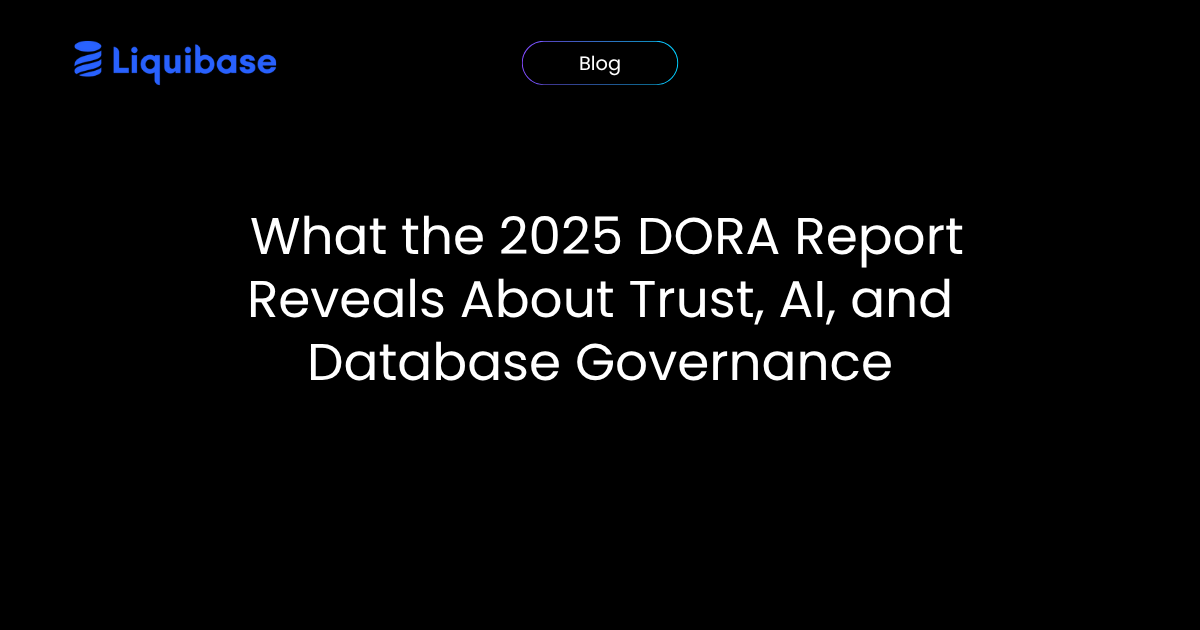Liquibase Secure and MongoDB: A Match Made for AI Acceleration, Part 2
June 25, 2025
See Liquibase in Action
Accelerate database changes, reduce failures, and enforce governance across your pipelines.

Last week we discussed why data governance is so challenging in today’s increasingly AI-driven landscape. Weak data governance and a lack of observability and transparency can frustrate and minimize any gains that AI might promise.
To make data governance efforts effective, organizations must embrace four key principles:
- Clarity: Providing clarity on available data assets to support informed decision-making.
- Control: Strategically balancing data accessibility with robust security measures.
- Quality assurance: Guaranteeing data reliability for dependable analytics and insights.
- Ownership: Cultivating leadership engagement and fostering organization-wide adoption.
By focusing on these pillars, organizations can build trust in data, effectively utilize it, and ensure its protection, ultimately contributing to a stronger competitive edge. Liquibase Secure helps support these pillars by making governance possible at scale when working with flexible database architectures like the one provided by MongoDB. Let’s make that concept real with an example:
Example: Enforcing Data Quality Standards for AI and ML Applications
Here's where the traditional siloed approach creates critical vulnerabilities or flaws in the conclusions of an AI model output. In an ideal world, it would be named and defined consistently in the same format and data type conventions everywhere. In the real world, it's often not!
Enforcing data quality standards within MongoDB becomes exponentially more critical for AI and ML applications because these systems amplify and perpetuate every data inconsistency they encounter across their entire operational lifespan. Unlike traditional applications that might gracefully handle or isolate poor data quality to specific reports or dashboards, AI models trained on inconsistent MongoDB collections - where product identifiers vary between "ProductID," "SKU," and "Item_Code" across different documents - will learn these inconsistencies as legitimate patterns and apply them unpredictably throughout their decision-making processes. This means a retail customer’s recommendation engine might fail to recognize that the same product exists across multiple collections, leading to fragmented customer profiles and suboptimal recommendations, while a demand forecasting model might treat identical products as separate entities, fundamentally skewing its predictions.
The flexible schema nature of MongoDB, while advantageous for AI's evolving data needs, can become a liability without proper governance controls because it allows these quality issues to proliferate silently across document collections until they manifest as inexplicable model behaviors, biased outputs, or systematic decision-making errors that require extensive retraining to correct. By implementing rigorous data quality enforcement through tools like Liquibase Secure, organizations ensure that MongoDB's flexibility serves AI innovation rather than undermining the foundational data integrity that high-quality machine learning outcomes absolutely depend upon.
Liquibase Secure Policy Checks - A Framework for Data Governance for the MongoDB Flexible Schema
A defined set of governance standards is the first step. Having a place where developers, data architects and DBAs can find all of such policies is a foundational step. Once these rules and guidelines are established we can use Liquibase Secure’s policy check feature to ensure these rules are followed when database changes are made that make reference to a data attribute, collection or other database object containing the word “product”. Examples of rules that could be created and proactively enforced as database change scripts are created and committed to a source code management repository:
- Checking for the existence of a collection validator when creating a new collection in a MongoDB
- Ensuring fields are present - if a collection is being created that contains the string “product” in the collection name, making sure there is a validator defined that includes an attribute called productID
- Verifying data types (e.g., string based for productID example ).
- Validating value ranges (e.g., maxLength 15 for productID example ).
- Using regular expressions for specific formats if related to how the value will be consumed or interpreted (e.g., ####-########### or ############### )
See a short demo of these policy checks in action here.
In order to be able to apply these rules at scale in large enterprise environments this process needs to be automated at scale. In our 2025 State of Database DevOps report, a key finding was that teams that have less mature DevOps practices around database change management are also struggling with AI/ML data pipeline workload management. AI and ML systems are fundamentally data-driven, making automated database change management with data governance baked in the differentiator between organizations that will thrive in the AI economy and those that will struggle to keep pace. Organizations still relying on manual data processes and data governance enforcement are rapidly finding themselves at a competitive disadvantage as AI-native companies leverage streamlined data operations to iterate faster, deploy more reliable models, and scale their AI capabilities across the enterprise.
.png)
Liquibase Flow - Automated and Consistent Application of Data Governance Policy Enforcement
The other components of creating a governance framework that can be applied in an automated fashion at scale across an enterprise is standardization and consistency. Liquibase Secure’s flow file feature, standardizes how your governance policies are applied consistently across all MongoDB instance deployments - from development environments where AI models are being trained to production clusters serving live applications - creating the enterprise reliability that prevents the schema inconsistencies and deployment failures that typically plague AI scaling efforts. A flow file is a template of steps that are executed by a CI/CD tool such as Jenkins, CloudBees, gitlab or GitHub tool that ensures every database change deploy execution is running the same guard rails and audit captures consistently as part of the database change process.
Flow files also offer operational agility by providing a fully parametrized layer of abstraction from your CI/CD scripting so that once you have established the workflow of actions you are executing with liquibase you can publish it as the standard for all projects using a particular database type, such as MongoDB, and then roll it out to all of the related application code repos utilized rather than having to have your DevOps platform team edit the master pipeline files to make changes in all repo pipelines making Liquibase calls.
Another benefit is that it allows you to execute operating system level calls in this workflow without leaving liquibase and coming back. A common use case customers use is to use the database platform specific client utilities, such as MongoDB’s mongostat, to check the performance load on a target database prior to executing change scripts that may add a significant resource demand during deployment.
Liquibase Observability - Tracing and Revealing the Bigger Governance Picture via Feedback
Liquibase Secure generates comprehensive audit trails through structured logging and operational reports that not only satisfy regulatory and compliance requirements but create a comprehensive auditing framework that operates at both granular deployment levels and strategic enterprise analytics. This enables organizations to transform their data governance from reactive compliance to proactive optimization. At the individual deployment level, detailed logs capture every schema change, policy check result, and deployment outcome across MongoDB instances, providing immediate visibility into what succeeded, what failed, and why - critical for troubleshooting AI model training issues or diagnosing data quality problems in real-time.
The long term strategic value emerges through leveraging Liquibase Secure's structured logs with an enterprise observability tool, such as Elastic Kibana, Grafana, DataDog or dynaTrace which can aggregate deployment patterns, failure rates, and performance metrics across the entire MongoDB footprint to reveal systemic bottlenecks and optimization opportunities. These analytics enable data teams to identify recurring deployment delays, frequent rollback patterns, or policy violations that consistently slow AI development cycles, creating a continuous improvement feedback loop where governance insights directly inform infrastructure decisions. For example, trending reports might reveal that certain types of schema changes consistently require multiple iterations due to policy violations, prompting teams to create better templates or adjust policy checks related to governance rules, ultimately reducing time-to-market for new AI or GTM product features while simultaneously lowering operational costs through more efficient deployment processes and reduced manual intervention requirements.
Summary
Liquibase Secure brings automated change management, data governance policy checks, rollback capabilities, and compliance audit trails to MongoDB's schema-flexible environment, enabling AI teams to iterate quickly on data structures while maintaining the governance controls that prevent the Product ID chaos described above from ever taking root. This combo allows organizations to enforce consistent data governance and quality standards across all MongoDB database collections. While MongoDB's native support for vector embeddings, horizontal scaling, and diverse data types accommodates the complex, evolving requirements of generative and agentic AI applications without forcing them into rigid relational constraints.
Next Action
Liquibase Secure helps organizations speed development and respond to the rapid pace of AI by delivering database change faster with the right controls in place.
Book a live demo.
Frequently Asked Questions
Can Liquibase Secure support my compliance reporting requirements? How does Liquibase Secure support comprehensive audit trails?
Liquibase Secure generates comprehensive audit trails through structured logging and operational reports that not only satisfy regulatory and compliance requirements but create a comprehensive auditing framework that operates at both granular deployment levels and strategic enterprise analytics.
What does the Flow capability within Liquibase Secure provide?
Liquibase Flow unlocks organizations by providing an automated and consistent application of data governance policy enforcement. Liquibase Secure’s flow file feature, standardizes how your governance policies are applied consistently across all MongoDB instance deployments - from development environments where AI models are being trained to production clusters serving live applications - creating the enterprise reliability that prevents the schema inconsistencies and deployment failures that typically plague AI scaling efforts. A flow file is a template of steps that are executed by a CI/CD tool such as Jenkins, CloudBees, gitlab or GitHub tool that ensures every database change deploy execution is running the same guard rails and audit captures consistently as part of the database change process.
How do Liquibase Secure policy checks help organizations meet data governance requirements?
With a set of defined governance standards in hand, developers, data architects and DBAs are enabled with a single resource for policies. This foundational step increases transparency and supports developers as they increase ship velocity.. Once these rules and guidelines are established, Liquibase Secure’s policy check feature to ensure these rules are followed when database changes are made.



.png)

.png)
.png)
.png)






